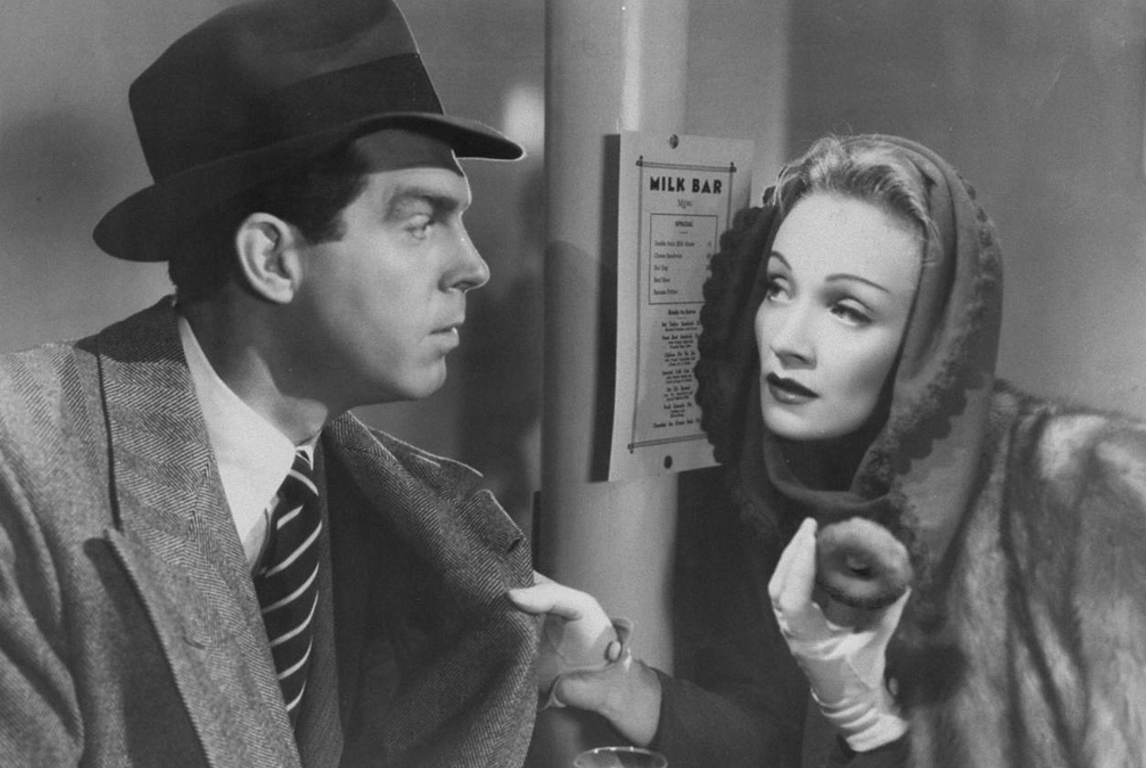A lot of selfish women suddenly realize later on in life the mistake they’ve made in not having had children when they were able to. Such is one of the many outdated cherries that gets presented to established Broadway theater actress Liza Madden (Marlene Dietrich) after she takes it upon herself to snatch an abandoned baby from a police officer as he’s in the process of apprehending a gangster at a nearby shady warehouse. Liza, apparently feeling an inexplicable connection to the child, is inclined enough to keep it, taking it with her in a cab back to her posh apartment on E. 85th Street. There, her assistant, Buddy (Aline MacMahon), and manager, Kenneth (Stanley Ridges), watch her act as though it’s the most natural thing in the world that she’s brought a baby home, waiting for her to explain how, exactly, she’s come to acquire it. This is where we get the distinct impression that Liza frequently has to be pulled out of her various reveries in order to be wrangled into doing something required by reality. Even as a dreamer, however, she still knows she needs to call an obstetrician for little Joanna–“Jo” as she’s taken to calling her. Asking the doorman for who the best in town is, she’s recommended Dr. Corey T. McBain (Fred MacMurray), and immediately calls him to tell him there’s an emergency and he’s got to come straight away.
In her position in life, she’s rarely heard the word no, this much is made evident in the first five minutes of the narrative. Dr. McBain is perplexed by her unusual ways, bombastic demeanor and otherwise “fabulous” personality. But because it’s a 40s screwball comedy, he is, of course, charmed by it. Any man of today who encountered her would, conversely, probably run in the other direction. Thus, when social services and the police inform her that she’s got to give the baby up or prove she’s financially solvent (she’s not, far from it in spite of her lavish lifestyle built on debts) or married, it’s inevitable that Dr. McBain will agree to be the man. After all, he’s already helped her figure out that Joanna is actually a boy. It’s in this scene as well that we get yet another dose of extremely staunch perspectives on gender as Liza insists, “But he was wearing pink. Girls wear pink and boys wear blue.” Dr. McBain counters, “For years, there’s been a far more scientific way to tell the difference.” If transgendered people had had a voice back in the day, this exchange would have gotten tomatoes thrown at it. The mammy archetype is also expectedly uncomfortable to watch in the form of Liza’s housemaid, Mary Lou (Marietta Canty). But this won’t be the only caricaturized stereotype to present itself in the course of James Edward Grant’s screenplay.
There’s also the cliche of the Italian American as gangster with bad accent and zero class. This plot point manages to materialize as one of several remarkably random ones when, a year after Dr. McBain and Liza have been living happily together with Corey, a married couple with a lawyer barge through to announce they’re the rightful parents and they’d like the baby back–unless, that is, Liza is willing to give them $25,000 for their trouble. Can you smell the con? Liza can’t.
Every strange or annoying behavior is excused away with the essential shrug, “But Liza, she’s got heart.” That’s all the explanation that’s needed, one supposes, even when, thanks to director Mitchell Leisen’s contending with the puritanical Hays Code of the era, Liza clearly overreacts to the presence of Dr. McBain’s ex-wife in their bedroom (complete with Lucy and Ricky separated twin beds and all). Her intense jealousy is only matched by her stubbornness in refusing to believe McBain’s attempt at explaining how his conniving “secondhand wife” ended up in there just when he and Liza had finally jumped over the hurdle toward romanticism.
As the film progresses, a barrage of internal questions ensue: Do they get married so quickly that Corey doesn’t have to go to social services at all? Does anyone in charge of the adoption process think it’s suspicious that she’s suddenly found a husband? How does it just so happen that Corey’s ex-wife lives in the same building as Liza? Is Liza blatantly ripping off Carmen Miranda in those performance scenes on stage or vice versa? Is the lothario leading man she spends her nights with actually just trying to use Liza as a beard? Why are those rabbits McBain uses for his experiments so large? Why is Corey sleeping with his pants on (other than that damned Hays Code)? These and other endless instances of gaping plot holes and political incorrectness will have you thinking about The Lady Is Willing long after you’ve seen it.






















